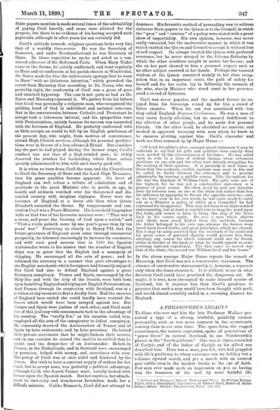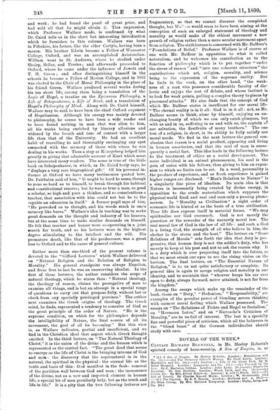A PHILOSOPHER'S LEGACY.*
To those who ever met him the late Professor Wallace pre- sented a type of a strong, truthful, painfully earnest personality, such as was more common in the seventeenth century than in our own time. The spare form, the rugged countenance, the serious expression, spoke of generations of "grave livers" in earnest Scotland, to use Wordsworth's phrase in the "Leech-gatherer." One was at times reminded of Carlyle, and of the father of Carlyle as his gifted son described him. Here was a man, you felt, who had grappled with life's problems, to whom existence was no holiday but a toilsome upward march, and yet a march with an assured goal visible even in the hardest tracks to the eye of faith. Few men ever made such an impression on you as having won the treasures of the soul by more faithful life " Lectures and Essays on Natural Theology and Ethics. By William Wallace Edited, with a Biographical Introduction, by Edward Caird, Master of Ballio College, Oxford. Word: The Clarendon Press. 112s. 61.1
and work ; he had found the pearl of great price, and had sold all that he might obtain it. This impression, which Professor Wallace made, is confirmed by what Dr. Caird tells us in the short but interesting introduction which he furnishes to this volume. Wallace was born in Fifeshire, his father, like the elder Carlyle, having been a mason. His brother Edwin became a Fellow of Worcester College, Oxford, and was an accomplished Aristotelian. William went to St. Andrews, where he studied under Shairp, Seller, and Ferrier ; and afterwards proceeded to Oxford, where he came under the influence of Jowett and T. H. Green ; and after distinguishing himself in the schools he became a Fellow of Merton College, and in 1882 was elected to the Chair of Moral Philosophy in the place of his friend Green. Wallace produced several works during his too short life, among them being a translation of the Logic of Hegel, a treatise on the Epicurean Philosophy, a We of Schopenhauer, a Life of Kant, and a translation of Hegel's Philosophy of Mind. Along with Dr. Caird himself, Wallace may be said to have been the chief Oxford exponent of Hegelianism. Although his energy was mainly devoted to philosophy, he seems to have been a wide reader and to have found nothing in man that was alien to him, all his works being enriched by literary allusions and widened by the breath and tone of contact with a larger life than that of the University. He had an excellent habit of travelling to and thoroughly envisaging any spot connected with the memory of those with whom he was dealing in his works. Thus a stay at Konigsberg helped him greatly in giving that admirable account of Kant which must have interested many readers. The same is true of the little book on Schopenhauer, in which, as Dr. Caird truly says, he "displays a very rare biographical gift." Of his personal in- fluence at Oxford we have many testimonies quoted here. Dr. Fairbairn said of him, " It might be hard to some, though to none so hard as to himself, to break through his habitual and constitutional reserve; but he was so true a man, so good a scholar, so high and pure a thinker, and so conscientious a teacher, that association with him could not but be to the capable an education in itself." A former pupil says of him, "He provoked us to thought, and his words stuck in one's memory like burrs." Wallace's idea in teaching was to make great demands on the thought and industry of his hearers, but at the same time to make similar demands on himself. He felt that teacher and hearer were co-operating in a joint search for truth, and so his lectures were in the highest degree stimulating to the intellect and the will. His premature death, like that of his predecessor, was a great loss to Oxford and to the cause of general culture.
Rather more than one-third of the present volume is devoted to the "Gifford Lectures" which Wallace delivered on "Natural Religion and the Relation of Religion to Morality." His general standpoint was always Hegelian, and from first to last he was an unswerving idealist. In the first of these lectures, the author considers the scope of natural theology, which he states thus : "Natural theology, the theology of reason, claims the prerogative of man to examine all things, and is but an attempt in a special range of questions to carry out that purpose fully, without bar or check from any specially privileged province." The author next examines the Greek origins of theology. The Greek mind, he finds, represented a tendency to conceive of God as the great principle of the order of Nature. "He is the supreme condition, on which for the philosopher depends the intelligibility of Nature, the final source of all its movement, the goal of all its becoming." But this view is, as Wallace indicates, partial and insufficient, and we find in the Christian ideal that aspect which Greek thought omitted. In the third lecture, on "The Natural Theology of Christ," it is the union of the divine and the human which is represented as the central fact. "The great deed that seems to emerge as the life of Christ is the bringing into one of God and men : the discovery that the supernatural is in the natural, the spiritual in the physical : the eternal life as the truth and basis of this : God manifest in the flesh : removal of the partition wall between God and man : the immanence of the divine, not as a new and imported element in human life, a special bit of man peculiarly holy, but as the truth and life in life." It is a pity that the two following lectures are fragmentary, so that we cannot discover the completed thought, but %Var tee would seem to have been aiming at the conception of such an enlarged statement of theology and morality as would make of the ethical movement a new growth of religion rather than a mere secular movement apart from religion. The sixth lecture is concerned with Mr. Balfour's "Foundations of Belief." Professor Wallace is of course at one with Mr. Balfour in opposition to what is called naturalism, and he welcomes his contribution as to the function of philosophy which is to put together "under the stress of reason" and "into one coherent structure" the contributions which art, religion, morality, and science bring to the expression of the supreme reality. But he finds in the work, on the other hand, "the weak- ness of a man who possesses considerable faculty of dia- lectic and enjoys the zest of debate, and whose instinct is to look for weak points, pulling a complex theory to pieces by piecemeal attacks." He also finds that the concept of God which Mr. Balfour states is insufficent for our moral life. "The eternal reality is in it all : God is in it all : not, as Mr. Balfour seems to think, alone by himself, enjoying an un- changing beauty of which we can only catch glimpses, but with us and in us, suffering in us and with us, the captain of our salvation, the firstfruits of many brothers." The one test of a religion, in short, is its ability to fully satisfy our moral needs. We find in the next lecture the general con- clusion that reason is a social product, appearing and living in human association, and that the soul of man is conse- quently a social fact. This idea leads in the following lecture to the treatment of ethics as a social development. The mere individual is an animal phenomenon, his soul is the gain of union with his fellows, thus giving to him an expan- sion to which no limits can be set. In a word, personality is the product of experience, and as fresh experience is gained higher ranges are disclosed. "Man's Relation to Nature" is a singularly fine piece of idealism. Its main idea is that Nature is incessantly being created by divine energy, in opposition to the crude materialism which supposes the physical world fixed and real and man only a passing pheno- menon. In "Morality as Civilisation" a right order of economic life is hinted at as the basis of a true civilisation. True life does express itself in material forms. "We may spiritualise our God overmuch. God is not merely the guardian or the rewarder of the narrowly moral law. The real moral law of God is the law of all life : and such a God is a living God, the strength of all who believe in him, the shelter in the storm and the heat." The lecture on "Some Relations of Morals" sets forth the idea that duty is pro- gressive, that human duty is not the soldier's duty, who has merely to keep at his post and not to ask the reason why. It is a duty which is ever projecting itself into the future, so that we must strain our eyes to see the rising vision on the horizon. The final lecture, on "The Essential Nature of Religion," is to us not quite satisfactory or complete. Its general idea is again to merge religion and morality in one identity, and to maintain that "whoever keeps his ear ever open to duty, always forward, never attained, is not far from the kingdom."
Among the essays which make up the remainder of the book, those on "Duty," "Hedonism," "Responsibility," are examples of the peculiar power of blending severe thinking with earnest moral feeling which Wallace possessed. The essays on "The Relations of Fichte and Hegel to Socialism," on "Hermann Lotze," and on " Nietzsche's Criticism of Morality," are to us full of interest. The last is a specially fine and powerful piece of criticism, which all the believers in the "blond beast" of the German individualist should study with care.







































 Previous page
Previous page